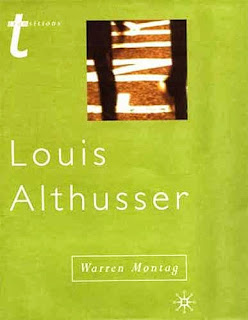Warren Montag over Louis Althusser (1918 - 1990) en Spinoza
 Dat Warren Montag een groot kenner van Louis Althusser (en Spinoza) is laat hij zien aan twee werken die hij dit jaar publiceerde. Daarover zo dadelijk.
Dat Warren Montag een groot kenner van Louis Althusser (en Spinoza) is laat hij zien aan twee werken die hij dit jaar publiceerde. Daarover zo dadelijk.
Althusser schreef en onderwees niet eens zoveel over Spinoza, zo lezen we in Montag's voortreffelijke inleiding bij de Engelse vertaling van Etienne Balibar's Spinoza and Politics. Maar het feit dat Althusser zich Spinozist noemde had grote invloed in de '60-ger jaren, toen hij hoofd was van de Ecole Normale Supérieur. Men moest minstens van Spinoza gehoord hebben, was zijn stelregel. De Marx-lezing zoals hij en zijn studenten en medewerkers (w.o. Balibar) via a.h.w. de lenzen van Spinoza voltrokken, liet een heel nieuwe vorm van Marxisme én via vervolgens weer injectie met Marx's inzichten van Spinoza's teksten een geheel nieuw Spinozisme opbloeien - een Spinozisme van een Marxistische smaak: een die een diepgaander materialistische leeswijze introduceerde dan er eerder bestond (zeker na de meer idealistische leeswijze van de vroegere Duitse romantici en idealisten).
De materiële kant van Ideologie
Althusser zag in Spinoza de eerste die een adequate 'theorie van de ideologie' had ontwikkeld; één waarin de fout vermeden werd in ideologie alleen maar of vooral een "vals bewustzijn" te zien. In Spinoza zag hij de mogelijkheid om een aantal valkuilen van de "klassieke ideologiekritiek" te vermijden, n.l. dat het imaginaire geen realiteit of materialiteit zou bezitten. In de gelijkstelling van de belangrijkste ideologie van zijn tijd, n.l. de religie, met "product van de verbeelding", zag Spinoza zijn typering niet als die van "een illusie". Integendeel, ideologie was als elke imaginatio niet een zuivere vergissing, of alleen maar iets negatiefs of ontkenning van realiteit: er zat een kern van (praktische) waarheid in, waardoor mensen en de samenleving er nut van konden ondervinden. Althusser muntte de notie (zoals Montag omschrijft - cf. hierna de inleiding "Why Read Althusser Today?"): “the material existence of ideology”.
 Dit jaar bracht Warren Montag twee boeken over Althusser op de markt:
Dit jaar bracht Warren Montag twee boeken over Althusser op de markt:
Warren Montag, Louis Althusser. [Collection "Transitions"] Palgrave Macmillan, 2003 [Amazon]
This introductory guide to Louis Althusser provides the first major overview of his work since the publication in French of thousands of pages of essays, books, and letters unknown before 1990. Focusing on Althusser's writing on art, theater, and literature, Warren Montag traces the contradictory development of Althusser's thought from the early 60s to his autobiography, The Future Lasts Forever. Montag also explores how Althusser's reflections on reading can shed new light on well-known texts such as Heart of Darkness and Robinson Crusoe.
 Warren Montag, Althusser and His Contemporaries: Philosophy's Perpetual War. Duke University Press Books , 2013 [Amazon - books.google]
Warren Montag, Althusser and His Contemporaries: Philosophy's Perpetual War. Duke University Press Books , 2013 [Amazon - books.google]
"Introduction. Why Read Althusser Today?" [PDF]
Het zal niet verbazen dat we in deze boeken vaak de naam van Spinoza tegenkomen.
Ik verwijs hier vervolgens nog naar de volgende eerdere werken van Montag:
 Warren Montag, Bodies, Masses, Power: Spinoza and His Contemporaries. Verso, 1999 [books.google]
Warren Montag, Bodies, Masses, Power: Spinoza and His Contemporaries. Verso, 1999 [books.google]
This book seeks to show, against the grain of English language commentary, that Spinoza is neither a Cartesian nor a liberal but precisely the most thoroughgoing materialist in the history of philosophy. The work begins by examining Spinoza's notion of the materiality of writing, a notion developed through his examination of Scripture. It then postulates the three fundamental principles of Spinoza's philosophy: there can be no liberation of the mind without a liberation of the body, and no liberation of the individual without a collective liberation, and that the written form of these propositions itself possesses a corporeal existence, not as the realization or materialization of a pre-existing mental, spiritual intention, but as a body among other bodies. Ultimately, the book prompts us to consider Spinoza's philosophy anew, by replacing questions like 'Who has read it?' and 'Of those, how many of us have understood it?' with 'What material effects has it produced, not only on or in minds, but on bodies as well?' and 'To what extent has it moved bodies and what has it moved them to?'
Toepassing
Caleb Miller sprak als enige over Spinoza op de massale Western Political Science Association’s Annual Conference [Spring 2012]: "Necessary Imaginations’: Spinoza and the Question of Critique." Daarin uitvoerig over Spinoza's ideologiekritiek volgens Warren Montag in Bodies, Masses, Power: Spinoza and his Contemporaries en hoe Hasanah Sharp op haar beurt weer van zijn analyse gebruik maakte. [PDF]
%2c_The_New_Spinoza.jpg) Warren Montag Ted Stolze (Ed.), The New Spinoza. Univ. of Minnesota Press, 1997 [books.google]
Warren Montag Ted Stolze (Ed.), The New Spinoza. Univ. of Minnesota Press, 1997 [books.google]
The essays collected in this volume suggest that what applies to Althusser applies to his whole generation -- that Spinoza is an unsuspected but very real presence in the work of contemporary philosophers from Deleuze and Lacan to Foucault and Derrida.
These essays, most of them appearing in English for the first time, establish Spinoza's rightful role in the development and direction of contemporary continental philosophy. The volume should interest not only the growing group of scholars attracted to Spinoza's thought on ethics, politics, and subjectivity, but also theorists in a variety of fields who have not yet understood how their work can productively engage Spinoza.
In dit boek een redelijk autobiografisch stuk van Louis Althusser over zijn 'ontdekking' van Spinoza; en het beroemde hoofdstuk van Gilles Deleuze, "Spinoza and the Three "Ethics""

